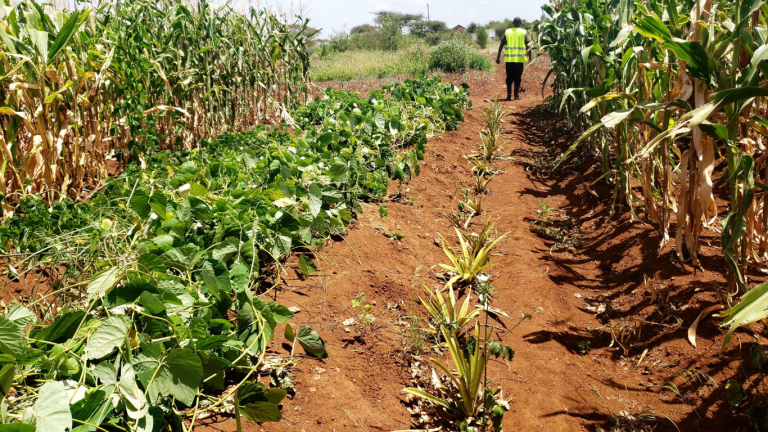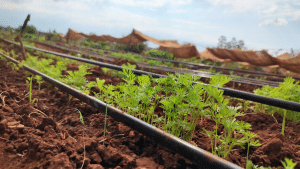
COMPANION PLANTING
In the heart of Ambokili Farm lies a profound understanding of nature’s intricate balance. Here, amidst the verdant fields and thriving crops, we embrace a practice as old as agriculture itself: companion planting. From our humble beginnings of cultivating a handful of plant varieties, we’ve undergone a remarkable transformation at Ambokili Farm. What once started with Black Nightshade (Managu), Spinach, Cowpeas, beetroot, and carrots has evolved into a diversely of cultivated farm. Now, across our fields, spanning 2 acres of maize, 1 acre of onions, and an additional 2 acres hosting a vibrant mix of tomatoes, vegetables, watermelon, baby melon, pumpkin, green grams, beans, millet, and sorghum, we’ve embraced the growing of over 11 different plants that are flourishing in shared spaces.
Companion Planting- an ancient practice renowned for its ability to enhance soil health and crop yields naturally. Companion planting involves strategically placing different crops together to create mutually beneficial relationships. It’s a strategic tactic of biodiversity that nurtures soil health and fosters abundant harvests.
Ambokili Farm: A Case Study in Success in Companion Planting
Companion across several acres has fostered a healthy ecosystem, leading to:
- Increased Crop Yield: By leveraging the natural interactions between plants, Ambokili Farm has witnessed a significant boost in their harvests.
- Reduced Pests: Certain plant combinations act as natural pest repellents, reducing the need for harmful chemical pesticides Fewer pests translated to lower expenses and healthier food for our consumers.
- Enhanced Soil Quality: Companion planting has nourished the soil, setting the stage for future generations of crops. E.g. By diversifying the root systems and nutrient uptake of plants. Nitrogen-fixing plants like legumes, when intercropped with other crops, enrich the soil with essential nutrients, reducing the reliance on synthetic fertilizers.
- Attraction of pollinators: Blooming companions attract bees and butterflies, ensuring proper pollination for our fruits and vegetables. This not only boosts yield but also supports the vital role of pollinators in our ecosystem.
- Efficient use of resources: Companion planting has allowed us the efficient use of space and resources. Taller crops can shade smaller ones, while fast-growing companions can be harvested before they compete with slower-growing ones. It’s a harmonious dance of maximising our resources.
- Increased Yield: The symbiotic relationships formed through companion planting has led to increased crop yields. Plants like beans and maize/corn, when we grew them together, mutually support each other’s growth, resulting in healthier and more productive harvests.
- Weed Suppression: Dense plantings and ground cover provided by certain companion plants help suppress weed growth, minimising the need for manual weeding and herbicides.
- Biodiversity: Companion planting fosters biodiversity, creating habitats for beneficial insects and microorganisms that contribute to ecological balance and resilience.
Contribution to Soil Health Conservation
Companion planting lies at the heart of our commitment to soil health conservation. By fostering diverse plant communities and minimising monoculture, Ambokili Farm nurtures the soil’s structure, fertility, and resilience. Through this broad-based approach to farming, we not only safeguard the land for future generations but also cultivate a sustainable model of agriculture that harmonizes with nature.







